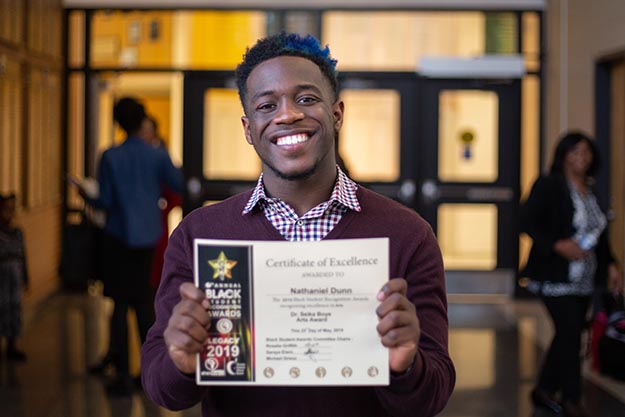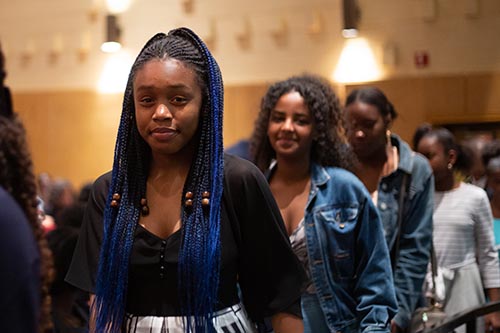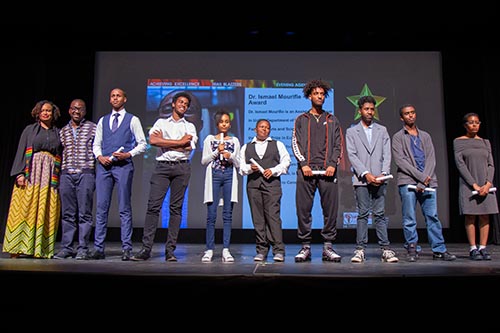
Setting high expectations at the Black Student Recognition Awards
By Shellene Drakes-Tull
Being acknowledged for doing good work puts a bright smile on all of our faces and makes us feel awesome. So picture the smiles on the faces of 235 TDSB students from 125 schools when they were celebrated at the 7th annual Black Student Recognition Awards hosted by the African Heritage Educators’ Network.
The African Heritage Educators’ Network, formally known as the Black Educators Network, was founded in 1984. The network is made up of educators, professionals and community members of African descent to address issues impacting students of African descent in the TDSB. The purpose of the group is to develop policies that support students and teachers of African descent, membership development, programming and curriculum development and parent and community mobilization.

It’s a celebration
The event recognizes Black students who are excelling in academics, athletics, the arts, STEM, aspirational, and community.
Shirley Airhia Jackson, a Grade 11 Northview Heights Secondary School student was nominated for the School/Community Involvement award. “I felt honoured to win a Black Student Recognition award because it felt great being recognized. I have been involved in so many activities and events in the community and I was happy to know that I was being acknowledged that night.”
Encouraging students is necessary for their success but we tend not to celebrate the achievements of our students, especially Black students, says Saraya Elwin, vice-principal at C.W. Jeffreys Collegiate Institute and awards co-chair with TDSB educators Rosalie Griffith and Michael Griesz. “We wanted to create a platform where students felt appreciated.”
Every year, the awards are named after six Black Canadians who have made a positive impact in their fields. This year, the awards are named for:
- Aspirational Honoree Weyni Mengesha, Artistic Director, Soulpepper
- Academics Honoree Dr. Alana Butler
- Athletics Honoree Jamal Campbell
- Arts Honoree Dr. Seika Boye
- School and Community Honoree Sarah Jama
- STEM Honoree Dr. Ismael Mourifié
This year’s educator award was named after TDSB Executive Superintendent Karen Falconer.
The event is also an opportunity to showcase the talented student performers who entertained the attendees with spoken word, dance and drumming performances.
Reuben Briggs, a Grade 7 student from General Crerar Public School won the Jamal Campbell Athletics award. “Winning a Black Student Recognition award made me feel proud of myself, happy, and thankful,” he says. “It’s important to recognize students who are doing well because it motivates students and makes them work harder. It also recognizes the students who put in the time and effort to accomplish their tasks and sets them apart from the rest of their classmates.”

Setting high expectations
Education can’t be done in isolation, students need support from teachers, parents, and their communities. “I believe in the African proverb, ‘It takes a village to raise a child’,” says Saraya. “We need to set high expectations for our Black students. We can’t just settle. Our students are brilliant, they’re talented. We have to set high expectations for them from elementary school—and we have to recognize all the amazing things they do from that very early age. We don’t have to wait until high school.”
And the expectations are not only high for students, but for the educators that interact with them daily, says Saraya. Sometimes teachers come with preconceived ideas about Black students. When that happens, by the time you get these students get to high school, they already have low self-esteem which affects their engagement and success in school.
“Education is not just a job, it’s a vocation,” she says. “You have to like what you’re doing—you have to like kids. You have to have patience. You have to be a caring adult. Sometimes, that’s all a student needs. They have the smarts, they have the intelligence, they just need a caring adult in the building to support them and help nurture them. We have got to continue setting high expectations for our students and we have to have educators who are passionate about what they’re doing.”
Congratulations to all the students and teachers who were recognized at this year’s awards event!